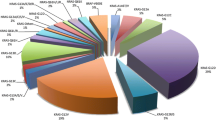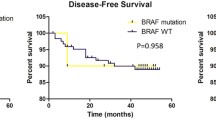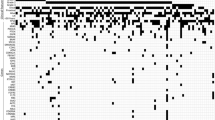Abstract
Alterations of the downstream effectors of the epidermal growth factor receptor (EGFR) are common events in colorectal cancer (CRC) carcinogenesis. Since EGFR serves as a target for therapy and some downstream effectors of EGFR have predictive and prognostic impact, reliable information on the frequency and concordance of alterations in the signaling pathway has become clinically significant. We, therefore, determined the frequency and coincidence of mutations in the EGFR pathway. We also analyzed the concordance of these alterations between primary tumor and distant metastases. Furthermore, we assessed their prognostic relevance for the development of metastasis. Mutations of KRAS exon 2, BRAF exons 11 and 15, AKT exon 3, and PIK3CA exons 9 and 20 were analyzed by pyrosequencing in 171 primary CRC samples as well as in 63 corresponding metastases. Furthermore, the expression of PTEN and EGFR was assessed by immunohistochemistry. Of the 171 tumors investigated, 60.2 % showed mutations in one or more genes of pathways downstream of EGFR. KRAS exon 2 and BRAF exon 15 mutations were detected in 40.9 and 11.1 % of cases, respectively, and were mutually exclusive. Mutations in exons 9 and 20 of the PIK3CA gene (18.7 %) largely overlapped with exon 2 KRAS mutations (16 of 32 cases; 50.0 %) and, to a lesser extent, with exon 15 mutations of BRAF (2 of 32 cases; 6.3 %). Only one case had simultaneous mutations of AKT exon 3 (0.6 %) and BRAF exon 15. Mutation analysis for KRAS exon 2, BRAF exon 15, PIK3CA exon 20, and AKT exon 3 in primary tumors and in their corresponding metastases revealed 100 % concordance. In one case, a PIK3CA exon 9 mutation in the primary tumor could not be detected in the matched distant metastases (κ = 0.9). Three different scores were applied for the evaluation of EGFR immunohistochemistry, and the range of positive cases varied between 8.8 and 52.6 %. Loss of PTEN expression was detected in 38.6 %. Although the expression of both markers does coincide with KRAS exon 2, BRAF exon 15, AKT exon 3, and PIK3CA exons 9 and 20 mutations, high discordance rates were found. The presence of at least one alteration in downstream effectors of the EGFR pathway was associated with a higher rate of distant metastases (p = 0.002). PIK3CA exons 9 and 20 mutations overlap with KRAS exon 2 and BRAF exon 15 mutations, and BRAF exon 15 and AKT exon 3 mutations co-occur in a single tumor, whereas KRAS exon 2 and BRAF exon 15 mutations are mutually exclusive. This suggests that mutations in the PIK3CA/PTEN/AKT branch of the EGFR pathway are less important than those of the RAS/RAF/MAPK branch for the progression of CRC. We found no difference in the mutational status of KRAS exon 2, BRAF exon 15, and AKT exon 3 between primary tumor and distant metastasis, validating both for diagnostic purposes. PIK3CA exons 9 and 20 mutations can be discordant between primary tumor and distant metastasis, and therefore, the lesion which is targeted for therapy should be tested. Protein expression of PTEN and EGFR using current protocols yields highly discordant results, and better standardization is needed before these markers can be used for diagnostic purposes.



Similar content being viewed by others
References
Fearon ER (2011) Molecular genetics of colorectal cancer. Annu Rev Pathol 6:479–507. doi:10.1146/annurev-pathol-011110-130235
Mitsudomi T, Yatabe Y (2010) Epidermal growth factor receptor in relation to tumor development: EGFR gene and cancer. FEBS J 277(2):301–308
Krasinskas AM (2011) EGFR signaling in colorectal carcinoma. Pathol Res Int 2011:932932
El Zouhairi M, Charabaty A, Pishvaian MJ (2011) Molecularly targeted therapy for metastatic colon cancer: proven treatments and promising new agents. Gastrointest Cancer Res 4(1):15–21
Liao X, Lochhead P, Nishihara R, Morikawa T, Kuchiba A, Yamauchi M, Imamura Y, Qian ZR, Baba Y, Shima K, Sun R, Nosho K, Meyerhardt JA, Giovannucci E, Fuchs CS, Chan AT, Ogino S (2012) Aspirin use, tumor PIK3CA mutation, and colorectal-cancer survival. N Engl J Med 367(17):1596–1606. doi:10.1056/NEJMoa1207756
Baas JM, Krens LL, Guchelaar HJ, Morreau H, Gelderblom H (2011) Concordance of predictive markers for EGFR inhibitors in primary tumors and metastases in colorectal cancer: a review. Oncologist 16:1239–1249. doi:10.1634/theoncologist.2011-0024. [pii] theoncologist.2011-0024
Italiano A, Hostein I, Soubeyran I, Fabas T, Benchimol D, Evrard S, Gugenheim J, Becouarn Y, Brunet R, Fonck M, Francois E, Saint-Paul MC, Pedeutour F (2010) KRAS and BRAF mutational status in primary colorectal tumors and related metastatic sites: biological and clinical implications. Ann Surg Oncol 17(5):1429–1434. doi:10.1245/s10434-009-0864-z
Heinemann V, Stintzing S, Kirchner T, Boeck S, Jung A (2009) Clinical relevance of EGFR- and KRAS-status in colorectal cancer patients treated with monoclonal antibodies directed against the EGFR. Cancer Treat Rev 35(3):262–271
Neumann J, Zeindl-Eberhart E, Kirchner T, Jung A (2009) Frequency and type of KRAS mutations in routine diagnostic analysis of metastatic colorectal cancer. Pathol Res Pract 205(12):858–862. doi:10.1016/j.prp.2009.07.010
Douillard JY, Siena S, Cassidy J, Tabernero J, Burkes R, Barugel M, Humblet Y, Bodoky G, Cunningham D, Jassem J, Rivera F, Kocakova I, Ruff P, Blasinska-Morawiec M, Smakal M, Canon JL, Rother M, Oliner KS, Wolf M, Gansert J (2010) Randomized, phase III trial of panitumumab with infusional fluorouracil, leucovorin, and oxaliplatin (FOLFOX4) versus FOLFOX4 alone as first-line treatment in patients with previously untreated metastatic colorectal cancer: the PRIME study. J Clin Oncol 28(31):4697–4705. doi:10.1200/JCO.2009.27.4860
Gattenlohner S, Etschmann B, Kunzmann V, Thalheimer A, Hack M, Kleber G, Einsele H, Germer C, Muller-Hermelink HK (2009) Concordance of KRAS/BRAF mutation status in metastatic colorectal cancer before and after anti-EGFR therapy. J Oncol 2009:831626. doi:10.1155/2009/831626
Finkelstein SD, Sayegh R, Christensen S, Swalsky PA (1993) Genotypic classification of colorectal adenocarcinoma. Biologic behavior correlates with K-ras-2 mutation type. Cancer 71(12):3827–3838
Etienne-Grimaldi MC, Formento JL, Francoual M, Francois E, Formento P, Renee N, Laurent-Puig P, Chazal M, Benchimol D, Delpero JR, Letoublon C, Pezet D, Seitz JF, Milano G (2008) K-Ras mutations and treatment outcome in colorectal cancer patients receiving exclusive fluoropyrimidine therapy. Clin Cancer Res 14(15):4830–4835. doi:10.1158/1078-0432.CCR-07-4906
Baldus SE, Schaefer KL, Engers R, Hartleb D, Stoecklein NH, Gabbert HE (2010) Prevalence and heterogeneity of KRAS, BRAF, and PIK3CA mutations in primary colorectal adenocarcinomas and their corresponding metastases. Clin Cancer Res 16(3):790–799. doi:10.1158/1078-0432.CCR-09-2446
Artale S, Sartore-Bianchi A, Veronese SM, Gambi V, Sarnataro CS, Gambacorta M, Lauricella C, Siena S (2008) Mutations of KRAS and BRAF in primary and matched metastatic sites of colorectal cancer. J Clin Oncol 26(25):4217–4219. doi:10.1200/JCO.2008.18.7286
Mao C, Zhou J, Yang Z, Huang Y, Wu X, Shen H, Tang J, Chen Q (2012) KRAS, BRAF and PIK3CA mutations and the loss of PTEN expression in Chinese patients with colorectal cancer. PLoS One 7(5):e36653. doi:10.1371/journal.pone.0036653, PONE-D-12-00782
De Roock W, Claes B, Bernasconi D, De Schutter J, Biesmans B, Fountzilas G, Kalogeras KT, Kotoula V, Papamichael D, Laurent-Puig P, Penault-Llorca F, Rougier P, Vincenzi B, Santini D, Tonini G, Cappuzzo F, Frattini M, Molinari F, Saletti P, De Dosso S, Martini M, Bardelli A, Siena S, Sartore-Bianchi A, Tabernero J, Macarulla T, Di Fiore F, Gangloff AO, Ciardiello F, Pfeiffer P, Qvortrup C, Hansen TP, Van Cutsem E, Piessevaux H, Lambrechts D, Delorenzi M, Tejpar S (2010) Effects of KRAS, BRAF, NRAS, and PIK3CA mutations on the efficacy of cetuximab plus chemotherapy in chemotherapy-refractory metastatic colorectal cancer: a retrospective consortium analysis. Lancet Oncol 11(8):753–762
De Roock W, De Vriendt V, Normanno N, Ciardiello F, Tejpar S (2010) KRAS, BRAF, PIK3CA, and PTEN mutations: implications for targeted therapies in metastatic colorectal cancer. Lancet Oncol 12:594–603
Ruschoff J, Hanna W, Bilous M, Hofmann M, Osamura RY, Penault-Llorca F, van de Vijver M, Viale G (2012) HER2 testing in gastric cancer: a practical approach. Mod Pathol 25(5):637–650. doi:10.1038/modpathol.2011.198, modpathol2011198
Regitnig P, Reiner A, Dinges HP, Hofler G, Muller-Holzner E, Lax SF, Obrist P, Rudas M, Quehenberger F (2002) Quality assurance for detection of estrogen and progesterone receptors by immunohistochemistry in Austrian pathology laboratories. Virchows Arch 441(4):328–334. doi:10.1007/s00428-002-0646-5
Loupakis F, Pollina L, Stasi I, Ruzzo A, Scartozzi M, Santini D, Masi G, Graziano F, Cremolini C, Rulli E, Canestrari E, Funel N, Schiavon G, Petrini I, Magnani M, Tonini G, Campani D, Floriani I, Cascinu S, Falcone A (2009) PTEN expression and KRAS mutations on primary tumors and metastases in the prediction of benefit from cetuximab plus irinotecan for patients with metastatic colorectal cancer. J Clin Oncol 27(16):2622–2629
Velho S, Moutinho C, Cirnes L, Albuquerque C, Hamelin R, Schmitt F, Carneiro F, Oliveira C, Seruca R (2008) BRAF, KRAS and PIK3CA mutations in colorectal serrated polyps and cancer: primary or secondary genetic events in colorectal carcinogenesis? BMC Cancer 8:255. doi:10.1186/1471-2407-8-255
Roock WD, Vriendt VD, Normanno N, Ciardiello F, Tejpar S (2011) KRAS, BRAF, PIK3CA, and PTEN mutations: implications for targeted therapies in metastatic colorectal cancer. Lancet Oncol 12(6):594–603. doi:10.1016/S1470-2045(10)70209-6
Albanese ISA, Migliavacca M, Russo A, Bazan V, Tomasino R, Colomba P, Tiagliavia M, Fariana M (2004) Heterogeneity within and between primary colorectal carcinomas and matched metastases as revealed by analysis of Ki-ras and p53 mutations. Biochem Biophys Res Commun 325:784–791
Suchy BZC, Rabes HM (1992) K-ras point mutations in human colorectal carcinomas: relation to aneuploidy and metastasis. Int J Cancer 52(1):30–33
Zauber PS-S, Marotta SP, Bishop DT (2003) Molecular changes in the Ki-ras and APC genes in primary colorectal carcinoma and synchronous metastases compared with findings in accompanying adenomas. J Clin Pathol 56:137–140
Losi LBB, Bouzourene H, Benhattar J (2005) Evolution of intratumoral genetic heterogeneity during colorectal cancer progression. Carcinogenesis 26(5):916–922
Weber JC MN, Pencreach E, Schneider A, Guerin E, Neuville A, Stemmer C, Brigand C, Bachellier P, Rohr S, Kedinger M, Meyer C, Guenot D, Oudet P, Gaub MP JD (2006) Allelotyping analyses of synchronous primary and metastasis CIN colon cancers identified different subtypes. Int J Cancer 120:524–532
Al-Mulla FGJ, Sowden E, Winter A, Pickford IR, Birnie GD (1998) Heterogeneity of mutant versus wild-type Ki-ras in primary and metastatic colorectal carcinomas, and association of codon-12 valine with early mortality. J Pathol 185:130–138
Cejas PL-GM, Aguayo C, Madero R, de Castro CJ, Belda-Iniesta C, Barriuso J, Moreno García V, Larrauri J, López R, Casado E, Gonzales-Barón M, Feliu J (2009) KRAS mutations in primary colorectal cancer tumors and related metastases: a potential role in prediction of lung metastasis. PLoS 4(12):8199
Garm Spindler KL PN, Rasmussen AA, Lindebjerg J, Andersen RF, Crüger D, Jakobsen A (2009) The importance of KRAS mutations and EGF61A>G polymorphism to the effect of cetuximab and irinotecan in metastatic colorectal cancer. Ann Oncol 20(5):879–884
Knijn NML, Klomp M, Vink-Börger ME, Tol J, Teerenstra S, Meijer JWR, Tebar M, Riemersma S, van Krieken JHJM, Punt CJA, Nagtegaal ID (2011) KRAS mutation analysis: a comparison between primary tumours and matched liver metastases in 305 colorectal cancer patients. BJC 104(6):1020–1026
Loupakis FRA, Cremolini C, Vincenzi B, Salvatore L, Santini D, Masi G, Stasi I, Canestrari E, Rulli E, Floriani I, Bencardino K, Galluccio N, Catalano V, Tonini G, Magnani M, Fontanini G, Basolo F, Falcone A, Graziano F (2009) KRAS codon 61, 146 and BRAF mutations predict resistance to cetuximab plus irinotecan in KRAS codon 12 and 13 wild-type metastatic colorectal cancer. BJC 101(4):715–721
Mariani PLM, Degeorges A, Cacheux W, Lappartient E, Margogne A, Pierga JY, Girre V, Mignot L, Falcou MC, Salmon RJ, Delattre O, De Cremoux P (2010) Concordant analysis of KRAS status in primary colon carcinoma and matched metastasis. Anticancer Res 30:4229–4236
Molinari FMV, Saletti P, De Dosso S, Spitale A, Camponovo A, Bordoni A, Crippa S, Mazzucchelli L, Frattini M (2009) Differing deregulation of EGFR and downstream proteins in primary colorectal cancer and related sites may be clinically relevant. Br J Cancer 100:1087–1094
LA Perrone F, Orsenigo M, Di Bartolomeo M, Gevorgyan A, Losa M, Frattini M, Riva C, Andreola S, Bajetta E, Bertario L, Leo E, Pierotti MA, Pilotti S (2008) PI3KCA/PTEN deregulation contributes to impaired responses to cetuximab in metastatic colorectal cancer patients. Ann Oncol 20(1):84–90
Santini DLF, Vincenzi B, Floriani I, Stasi I, Canestrari E, Rulli E, Maltese PE, Andreoni F, Masi G, Graziano F, Baldi GG, Salvatore L, Russo A, Perrone G, Tommasino MR, Magnani M, Falcone A, Tonini G, Ruzzo A (2008) High concordance of KRAS status between primary colorectal tumors ans related metastatic sites: implications for clinical practice. Oncologist 13:1270–1275
Giaretti WMR, Pujic N, Rapallo A, Nigro S, Geido E (1996) Intratumor heterogeneity of K-ras2 mutations in colorectal adenocarcinomas: association with degree of DNA aneuploidy. Am J Pathol 149(1):237–245
Tol JDJ, Klomp M, Teerenstra S, Dommerholt M, Vink-Borger E, van Cleef PH, van Krieken JH, Punt CJA, Nagtegaal ID (2010) Markers for EGFR pathway activation as predictor of outcome in metastatic colorectal cancer patients treated with or without cetuximab. EJC 46:1997–2009
Acknowledgments
We thank Mrs. Anja Heier, Antonela Kristo, Birgit Urban, Sabine Sagebiel, Alexandra Schindler, and Andrea Sendelhofert for the excellent technical assistance. We thank Carla Neumann for proofreading the manuscript and discussion. All authors read and approved the final manuscript.
Conflict of interest
Thomas Kirchner and Andreas Jung received financial support from AMGEN GmbH Germany and Merck-Serono KG for the implementation of a quality assurance system in Germany for the routine molecular–pathological analysis of KRAS mutations which is under the umbrella of the Quality Initiative in Pathology (QuIP) structure. QuIP is a structure founded and supported by the Deutsche Gesellschaft für Pathologie (German Society for Pathology) and the Bundesverband Deutscher Pathologen (Federation of the German Pathologists). All other authors have no competing interests.
Author information
Authors and Affiliations
Corresponding author
Additional information
Jens Neumann and Laura Wehweck contributed equally to this work.
Electronic supplementary material
Below is the link to the electronic supplementary material.
Supplemental Fig. 1
Specificity of PTEN detection. (A) Protein lysates of the PTEN-negative PC-3 (lane 1) and the PTEN-positive A-431 (lane 2) cell lines were blotted and stained with the antibody used for immunohistochemistry. The antibody detects the PTEN-antigen in A-431 cells, displayed at 54 kDa, whereas PC-3 showed no staining. Beta-actin was used as control. PTEN-negative PC-3 cells (B) and PTEN-positive A-431 cells (C) were formalin fixed and paraffin-embedded and subsequently immunohistochemically stained with the PTEN-antibody used for this study. Only in A-431 cells specific cytoplasmic staining could be obtained whereas PC-3 cells showed no staining. Immunohistochemical staining for PTEN revealed strong reactivity with blood vessels (used as endogeneous positive control) and in cancerous tissue but not in stroma cells (D). In serial sections the isotype control (E) showed no detectable staining. (JPEG 206 kb)
Supplemental Fig. 2
Comparison of the results of pyro-sequencing of AKT exon 3, BRAF exon 15, KRAS exon 2 and PIK3CA exon 9 and 20 between matched pairs of primary tumor and metastasis showing concordant and discordant results, respectively. (PPTX 1106 kb)
Rights and permissions
About this article
Cite this article
Neumann, J., Wehweck, L., Maatz, S. et al. Alterations in the EGFR pathway coincide in colorectal cancer and impact on prognosis. Virchows Arch 463, 509–523 (2013). https://doi.org/10.1007/s00428-013-1450-0
Received:
Revised:
Accepted:
Published:
Issue Date:
DOI: https://doi.org/10.1007/s00428-013-1450-0




